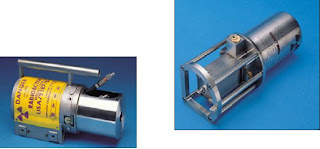Portable Devices
 -can be carried by one person; <>
-can be carried by one person; <>
-are the most common type used;
-typically contain 192Ir in activities up to 3.7 TBq
 -can be carried by one person; <>
-can be carried by one person; <>-are the most common type used;
-typically contain 192Ir in activities up to 3.7 TBq
Mobile Devices

-usually on a cart or trolley for ease of movement;
-typically contain 60Co
Fixed Devices
-are heavy;
-may use 8.5 - 37 TBq 60Co
-may use 8.5 - 37 TBq 60Co
Types of Operation
Category I
the source is not removed from the exposure device and a shutter or other mechanism is used to expose the source.
Category II
the source is projected outside the shielded source container (via a wind out cable, pneumatic device, etc through a projection sheath to the exposure position.
Category X
special applications
Category I Devices
-The source does not leave the device.
-It has a shutter mechanism.
-The source may be moved to the expose position by vacuum or air pressure.

Category II Devices
-The source is projected out of the source container.
-Remote controls are used.
-The source is unshielded during the exposure (but should be collimated when practicable).
-Manual or Automatic operation

Category X Devices
-Are used for special applications, ie gamma crawlers in pipelines.
-Their design and test requirements are dependent on the specific device application


1 comment:
Very interesting blog you got, I also want to thank you for taking the time to leave me a message on my blog.
Post a Comment